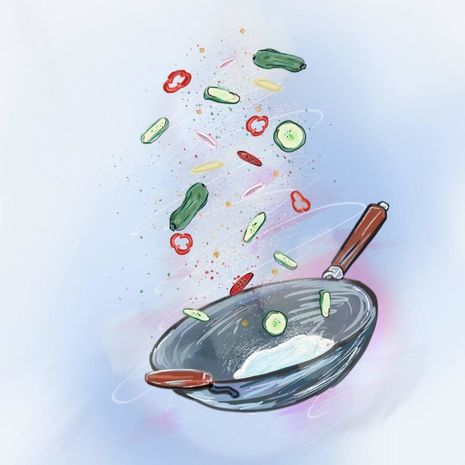Cooking my way through Covid
Anna Stirk finds novelty, creativity and distraction in cooking during lockdown, both at home and back at university

Lockdown is boring. Maybe the first few weeks, or even the first month, were exciting for the novelty of the situation; as an introvert, being told to stay at home and not socialise felt like a blessing at first. But too much of a good thing becomes a chore, and too much isolation is unbelievably dull. Thankfully, I had one thing that could redeem the boredom of being stuck at home with my family: cooking.
Not to disparage my college’s gyps, but the food that can be produced with a microwave, a kettle, and a toaster is quite limited. Consequently, being at home during term with access to a hob and an oven was a treat at first. I could stress-bake and then stress-eat any number of meals and cakes and brownies, without having to beg someone else for the use of their cooking facilities. Even the glut of courgettes from the garden over the summer was interesting, to start with.
Eating courgettes twice a day for months forced us to experiment — we had them boiled, fried, roasted, griddled, turned into sauerkraut, spiralized, and even turned into cake and brownies — but sure enough they still became monotonous and resented. When the courgettes finished and the bean crop took over as the principal vegetable in the house, this process repeated itself. It didn’t help that certain family members demanded their favourite dishes constantly — we had curry every week for five months until it was decided (by the aforementioned family member) that even they no longer liked it. As only one of us was fortunate enough to venture out to do the shopping each week, the shopping list took on a new and unforeseen importance, becoming a source of tense negotiation and a lesson in cooperation.
“Food and cooking helped me to retain a sense of change...”
One week, I snuck the ingredients for sushi on the list, assuming they would be summarily crossed off and ignored. However, contrary to my expectations, they duly appeared — I’d been asking to make sushi at home for years, and apparently we had reached such peak boredom that now was the time. Getting to grips with the unfamiliar ingredients (I hadn’t known nori existed until it turned up in the cupboard) and working out the different techniques for each part of the recipe was a welcome break from my coursework, to say the least.
Another ambitious effort was my attempt to make Lithuanian cepelinai, or potato dumplings filled with meat and eaten with sour cream. However, I don’t think ‘dumplings’ quite conveys the nature of these stodgy, strangely smooth lumps of grated potato. On holiday in Lithuania with friends a few years ago, we had these for lunch without knowing what we were getting ourselves in for: they are incredibly filling, with a frankly bemusing texture. The contrast of the salty meat in the centre and the sour cream on the side more than makes up for any confusion, though. Trying to recreate the dumplings took about four hours, but in the end wasn’t that part of the point?
“it was a chance to connect more, to look beyond the immediate household and Cambridge bubbles...”
Back in Cambridge for Michaelmas, my access to cooking facilities was reduced once more, but the newfound variety of food didn’t stop. One of my housemates from first year was also sharing a house with me this year, so our food-based cultural exchange continued where it had left off. I introduced her to boring fare like oatcakes and the fact that bagels need to be toasted, while she shared with me some of the homemade Korean food she’d brought back to Cambridge. Seaweed soup, LA galbi ribs, and dried squid with spicy mayo went a long way to livening up a relatively dull and lonely few months. It was one of the few lunches I had in the gyp over that term, shared with others, instead of alone in my room. We talked about our families’ culinary traditions — hers far more interesting than mine, in my opinion — and it was a chance to connect more, to look beyond the immediate household and Cambridge bubbles, and to think about a time when such cultural exchanges would become the norm again.
Consequently, I could take the announcement that Lent term would be online with relative equanimity. I would have been able to see very few of my friends even if I had been in Cambridge, and at least at home, I could work through the stresses of week five and all the other weeks of term by baking. By focusing on the ingredients in front of me, measuring and mixing and generally trying to keep other people from interfering, it was difficult to stay stressed about whatever historiographical debate was occupying the brunt of my time that week.
This term, and throughout the various lockdowns, strains and stresses of pandemic life, food and cooking helped me to retain a sense of change and practice creativity in a time when very little else was happening. Despite being stuck in one place, when even travelling to the next town was not an option, food enabled me to experience other cultures, culinarily visiting more countries in a week than I ever could have managed physically.
 News / Hundreds of Cambridge academics demand vote on fate of vet course20 February 2026
News / Hundreds of Cambridge academics demand vote on fate of vet course20 February 2026 News / University Council rescinds University Centre membership20 February 2026
News / University Council rescinds University Centre membership20 February 2026 News / Judge Business School advisor resigns over Epstein and Andrew links18 February 2026
News / Judge Business School advisor resigns over Epstein and Andrew links18 February 2026 News / Petition demands University reverse decision on vegan menu20 February 2026
News / Petition demands University reverse decision on vegan menu20 February 2026 News / Caius students fail to pass Pride flag proposal20 February 2026
News / Caius students fail to pass Pride flag proposal20 February 2026










